Yemen: Progress on Human Rights Amid Internal Conflict
Universal Periodic Review 46th Session
Review of Yemen - Fourth Cycle
1 May 2024

By Inès Najeh / GICJ
Executive summary
Established in 2006, the Universal Periodic Review (UPR) is a UN mechanism assessing countries' compliance with international human rights law obligations. The Working Group on the UPR held its forty-sixth session from 29 April to 10 May 2024. Yemen’s review occurred on 1 May 2024, led by His Excellency Mr Ahmed Omar Mohammed Arman, Minister of Legal Affairs and Human Rights.
The national report highlighted progress in addressing human rights issues such as discrimination, women’s rights, education, child soldiers recruitment, arbitrary detention, torture, freedom of expression, human trafficking, and the rights of vulnerable populations amidst the ongoing humanitarian crisis.
The Minister of Yemen emphasised that the ongoing conflict with the Houthis has impeded the full implementation of human rights legislation, despite the government's commitment to achieve effective change. He stressed the necessity to distinguish between human rights’ violations occurring in government-controlled areas and in Houthi-controlled territories, maintaining that some violations within the latter geographical boundaries lie beyond the government's control until hostilities cease.
During the review, member States presented a range of recommendations to Yemen. They urged the government to strengthen its efforts in protecting human rights, focusing on enhancing the legal framework and ensuring its implementation despite the ongoing conflict. Key recommendations included addressing discrimination, improving women's rights, ensuring access to education, preventing the recruitment of children into armed forces, and upholding freedom of expression. Additionally, member States highlighted the importance of tackling arbitrary detention, torture, human trafficking, and protecting the rights of vulnerable populations, including migrants, refugees, and internally displaced persons.
Geneva International Center for Justice (GICJ) commends Yemen for its dedication to implementing recommendations and creating new legislation to address human rights violations despite the ongoing conflict. GICJ urges the international community to provide assistance to the Yemen population and to reduce the dire humanitarian crisis exacerbated by the conflict. Yemen must swiftly explore alternative approaches to progress and end the conflict to improve the human rights situation, especially for vulnerable groups.
Background
Established in 2006, the Universal Periodic Review (UPR) is a United Nations mechanism designed to assess countries' advancements in meeting their international legal obligations. UN member states are examined during each cycle, the current one being the fourth cycle.
The Working Group on the UPR, established in accordance with Human Rights Council resolution 5/1, held its forty-sixth session from 29 April to 10 May 2024. The review of Yemen was held on 1 May 2024. Yemen was previously reviewed in May 2009, January 2014 and then in January 2019.
The delegation of Yemen was leaded by H.E. Mr Ahmed Omar Mohammed Arman, Minister of Legal Affairs and Human Rights. He recalled that Yemen accepted 201 recommendations out of the 252 received during the thirty-second session of the UPR in 2019. The national report (A/HRC/WG.6/46/YEM/1) pinpointed the progresses made by the country, achieved through the implementation of new policies, laws and strategies in order to fulfil its human rights obligations.
During the review, a spectrum of human rights concerns was addressed, alongside the presentation of Yemen's approach to deal with these issues. These encompassed issues such as discrimination, the rights of women, access to education, the illegal recruitment of children into armed forces, arbitrary detention and torture, freedom of expression and speech, human trafficking, the promotion of rights for vulnerable populations and the death penalty. Additionally, the matter of immigration, refugees, and internally displaced individuals was also examined, reflecting the ongoing humanitarian crisis exacerbated by the conflict in Yemen.
Yemen’s civil war began in 2014 with clashes between the Yemeni government and the Houthis, an armed group seeking to assert dominance over the country. The Houthis quickly seized the capital, Sanaa, and currently control a wide territory in North Yemen. Due to the conflict, the country now faces one of the world's worst humanitarian crises, with over 4.5 million internally displaced people, widespread famine, and limited access to healthcare amid cholera outbreaks. Both sides have committed human rights and international humanitarian law violations. During the introduction statement, Yemen’s Minister of Legal Affairs and Human Rights highlighted the concerning dimension of the refugee crisis, which includes at least 97,000 refugees and asylum seekers. Moreover, the ongoing economic crisis precipitates the situation.
Interactive Dialogue
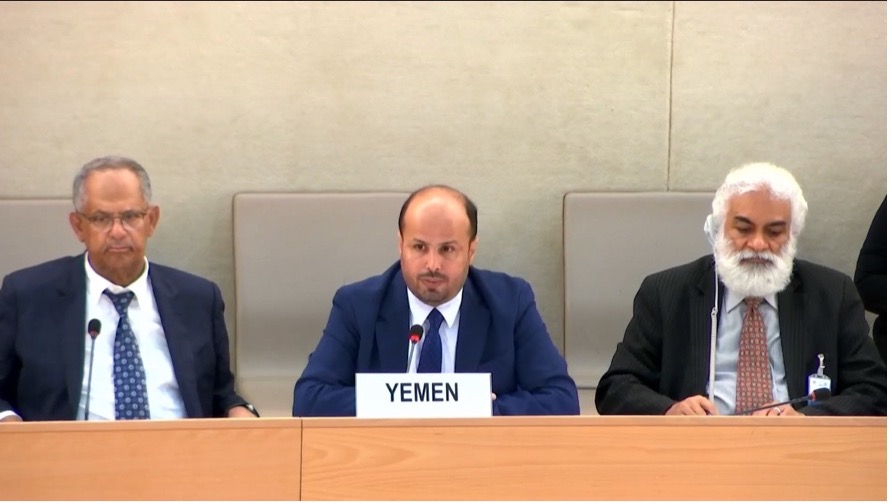
H.E. Mr Ahmed Omar Mohammed Arman, Minister of Legal Affairs and Human Rights, opened his dialogue by asserting that for the world to recover stability and balance, human rights need to be placed at the core of international politics and reaffirmed that the government of Yemen is adamant on addressing human rights issues and achieving cultural, economic and social progress. He recalled that the country has been suffering since 2014 from a conflict with the Houthis militia group, who eventually took control of the capital, Sanaa, by force and continue to commit grave violations of human rights and international humanitarian law. In the Houthis’ controlled territories, thousands of people have been killed extra-judicially. At the same time, freedom of expression, the right to assembly and many other rights have been restricted to a minimum.
H.E. Ahmed Omar Mohammed Arman recalled the government’s acceptance in April 2022 of a proposal of a UN envoy to obtain a humanitarian ceasefire. As the Houthis did not respect the agreement, the violations continued, and famine started spreading among Yemenis.
The Promotion of Rights for the Most Vulnerable Groups:
Yemen is committed to countering discrimination against women and is working to promote greater opportunities and equal rights, especially in decision-making processes, in compliance with the Convention on the Elimination of All Forms of Discrimination against Women (CEDAW) recommendations. As a result, for the first time, a woman was appointed judge in the Supreme Judicial Council.
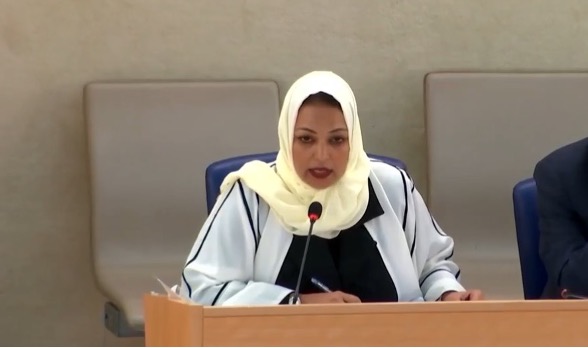 Among many delegations, the United Kingdom (UK), the United Arad Emirates recommended the meaningful participation of Yemeni women in peace-building reconstruction and development. The United States and Australia asked Yemen to ensure the representation of women in the political decision-making process and in public life. Finally, Member States urged Yemen to raise the minimum age for marriage to 18 in conformity with CEDAW and fully respect women’s fundamental rights.
Among many delegations, the United Kingdom (UK), the United Arad Emirates recommended the meaningful participation of Yemeni women in peace-building reconstruction and development. The United States and Australia asked Yemen to ensure the representation of women in the political decision-making process and in public life. Finally, Member States urged Yemen to raise the minimum age for marriage to 18 in conformity with CEDAW and fully respect women’s fundamental rights.
In response, Ms Ansam Salem Hussein Haidarah, Head of the Developments Department, contended that women’s rights violations are widely attributable to the Houthis, who have been restricting their right to free movement, which is completely against the government’s position to guarantee freedoms and rights for all.
Mr Nabil Abdulhafeedh Maged Ebrahim, Deputy Minister of Human Rights, replied that the ministry is working on engaging women and civil society in public life.
Due to the economic crisis, some families are offering their young girls in marriage to reduce the financial burden. To combat the phenomenon, the Committee on the Elimination of Discrimination against Women is pushing the government to establish a constitutional provision mandating that the minimum legal age for marriage be set at 18 years for women and men, ensuring alignment with CEDAW, the 2014 National Dialogue Conference, the 2014 draft law on Childhood and Safe Motherhood, and the draft Rights of the Child Act.
Ms Ansam Salem Hussein Haidarah highlighted that the Houthi militia is preventing efforts to hold regular parliamentary sessions to vote on these laws.
Child Recruitment into Armed Forces:
During the interactive dialogue, Switzerland urged Yemen to put an immediate end to the recruitment of children in the armed forces and bring to justice those responsible for such abuse. Releasing children from duty is essential for upholding the Action Plan signed with the UN in 2014.
In response, H.E Mr Ahmed Omar Mohammed Arman stated that Yemen is reaching out to all members of the society about the seriousness of child recruitment in the armed forces and children dropping out of school very early on. Policies and strategies have been put into place to prevent child recruitment and ensure an effective rehabilitation based on the action plan with the United Nations to end and prevent the recruitment of children by the Yemeni Armed Forces. Child exploitation by the Houthi militia needs to be urgently addressed as it constitutes a significant obstacle to any progress.
According to the national report, the Yemeni government has been implementing strategies to advance human rights and hinder the enlistment of child soldiers in its armed forces. Yemen has nominated a large number of focal points in military centres, and the defence ministry instructed the armed forces not to enlist children. As a result, Yemen was removed from the 2021 UN Secretary General’s report on children and armed conflict.
The Right to Education:
During its introductory statement, H.E. Mr. Ahmed Omar Mohammed Arman reaffirmed the government’s will to rehabilitate education centres and schools, including technical and vocational schools, and to allow refugees full access to education. He recalled that the Ministry of Education has been taking measures to develop curriculums with programs for people with disability and people in rural areas, considering the respect for human rights.
Member states, including Morocco and Kyrgyzstan, recommended that Yemen work harder on enhancing the quality of education systems to improve working skills and employability, particularly focusing on youth, women, and individuals with disabilities.
In response, Ms Ansam Salem Hussein Haidarah recalled that the government currently provides free education to counter school dropout and provides alternatives to prepare dropout students to rejoin the regular schooling systems.
The Question of Refugees:
The delegations of Equatorial Guinea, Iraq, and Somalia strongly recommended that Yemen continue guaranteeing the rights of refugees according to the 1951 Refugee Convention and its 1967 Protocol. The delegations also recommended enhancing the safeguarding of vulnerable groups, such as women, children, and internally displaced individuals, and strengthening social initiatives to ensure their protection.
The Yemeni Representatives upheld that Yemen remains steadfast in fulfilling its obligations under the 1951 Refugee Convention and its 1967 Protocol. He announced that the government is to pass a law regulating the flow of refugees while affording them effective protection, ensuring their rights and integrating them into the country’s development program. Yemen has been receiving an important number of refugees from the Horn of Africa, particularly from Somalia and Ethiopia, and has established, in response, partnerships with the UN refugee agency and IOM, which conduct visits to centres of refugees. The conflict with the Houthi militia has resulted in over 5 million internally displaced individuals, with 90% of them still residing in areas under the control of the militia group, enduring severe famine.
Freedom of Opinion:
The government of Yemen has developed programs and policies on audiovisual and media as part of its efforts to strengthen the rights of journalists and safeguard their freedom of opinion and speech while ensuring respect for national and religious values.
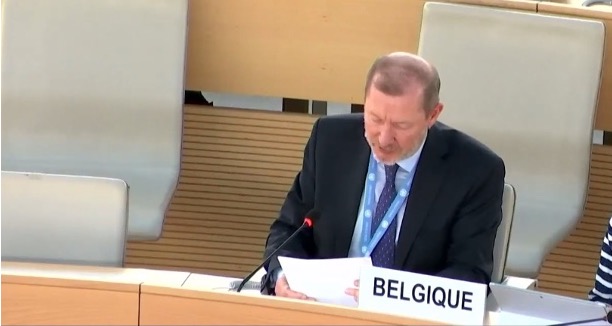 While recognising the importance of these rights, the Belgian delegation voiced concerns over ongoing violations and recommended an immediate end to the prosecution of activists and journalists. In addition, Belgium underscored the imperative to halt the practice of summoning journalists to military agencies for questioning, a tactic aimed at suppressing dissent and undermining press freedom.
While recognising the importance of these rights, the Belgian delegation voiced concerns over ongoing violations and recommended an immediate end to the prosecution of activists and journalists. In addition, Belgium underscored the imperative to halt the practice of summoning journalists to military agencies for questioning, a tactic aimed at suppressing dissent and undermining press freedom.
Addressing these critical issues, UNESCO urged the Yemeni government to adopt the United Nations Plan of Action on the Safety of Journalists and the Issue of Impunity. By exploiting this framework, Yemen could strengthen the safeguard of journalists, ensuring their protection.
Human Trafficking
To address the issue of human trafficking, the government has established a national commission gathering diverse stakeholders. Legislative acts and protocols aimed at combating trafficking and providing comprehensive protection to victims, ensuring their dignity – particularly regarding women and girls – have been presented to parliament. Concurrently, efforts to raise awareness within society regarding the dangers of trafficking have been undertaken, with a focus on limiting its occurrence. The duty to fight human trafficking stems from State obligations under international instruments, such as the UN Convention Against Transnational Organised Crime.
The delegation of China, among others, recommended protecting vulnerable groups against trafficking in persons.
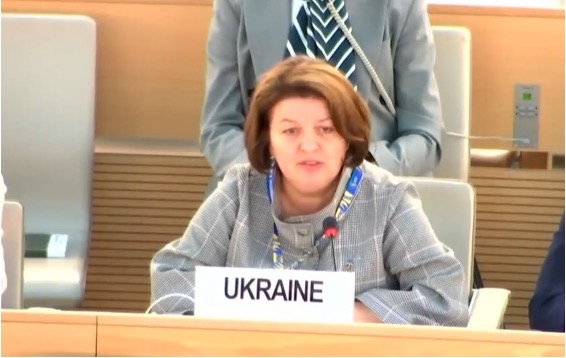 Ukraine recommended Yemen to ratify the Protocol to Prevent, Suppress and Punish Trafficking in Persons, Especially Women and Children, supplementing the UN Convention Against Transnational Organized Crime.
Ukraine recommended Yemen to ratify the Protocol to Prevent, Suppress and Punish Trafficking in Persons, Especially Women and Children, supplementing the UN Convention Against Transnational Organized Crime.
Addressing standing international obligations and the previously received recommendations, the national report specified that the Ministry of Legal Affairs and Human Rights is in the process of drafting a national strategy to combat human trafficking.
Combating Arbitrary Detention, Torture and Ill-treatment
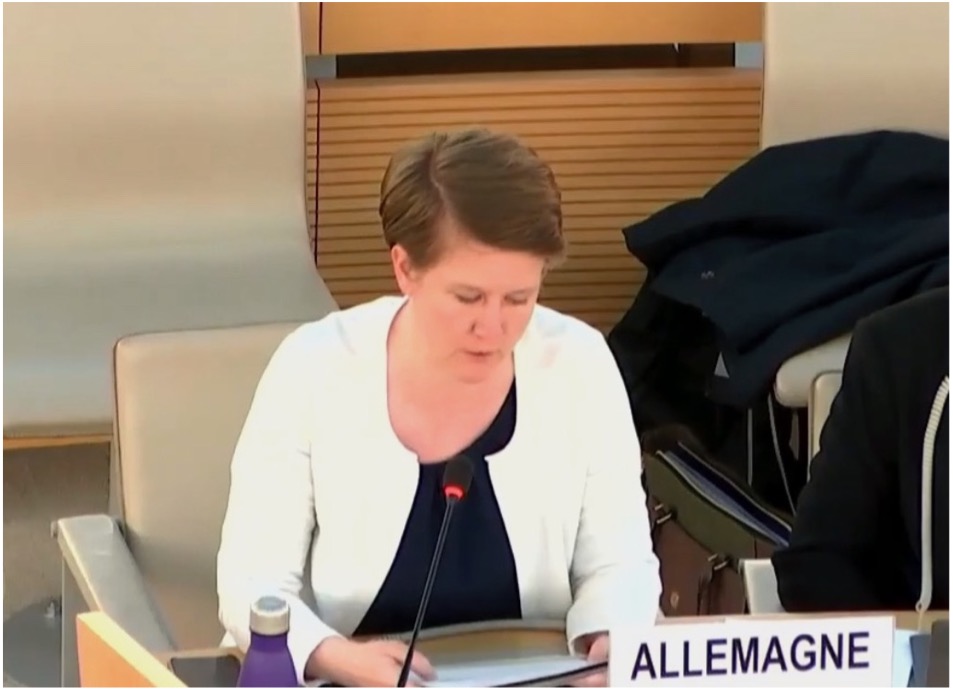 Among the questions submitted in advance of the review, Germany inquired about the steps taken by the Yemeni government to cease the practice of unlawful detention and torture in detention centres.
Among the questions submitted in advance of the review, Germany inquired about the steps taken by the Yemeni government to cease the practice of unlawful detention and torture in detention centres.
In response, H.E. Mr Ahmed Omar Mohammed Arman affirmed that the judge council had been reformed and now oversights the legality of detention and the respect of inmates’ rights to avoid torture or ill-treatment. He noted that there is currently no political prisoner in the government’s-controlled prisons and that the Houthis’ control impacts the ability to reinforce the implantation of new policies and effectively combat arbitrary detention, torture and ill-treatment of detainees.
Regarding the prohibition of torture and ill-treatment, the delegations of France and Slovenia recommended Yemen adopt the Second Optional Protocol to the International Covenant on Civil and Political Rights, aiming at the abolition of the death penalty and the Rome Statute of the International Criminal Court.
Position of Geneva International Centre for Justice
Geneva International Centre for Justice (GICJ) commends Yemen for actively engaging in the review process. Yemen demonstrates dedication in implementing recommendations and developing new legislation and strategies to address human rights violations and enhance the well-being of its citizens and immigrants. These efforts reflect a commitment to fostering a more just and inclusive society despite the challenges posed by ongoing conflict and socio-economic instability.
GICJ recognises that the conflict creates a dire humanitarian crisis that needs to be addressed with the help of international organisations and the international community. Yemen must find alternative approaches promptly rather than allowing the activities of the Houthis to impede the progress of implementing new legislation.
Despite efforts made, the human rights situation in Yemen remains dire, especially for vulnerable groups (women, children, and people with disabilities, etc).
GICJ stands with the Yemeni government’s endeavour to tackle disparities by reforming educational and criminal policies and providing economic aid to all. Ending the conflict is crucial to achieve these goals.
#Yemen #UPR #humanrights #War #GenevaInternationalforJustice #Geneva4justice #GICJ







